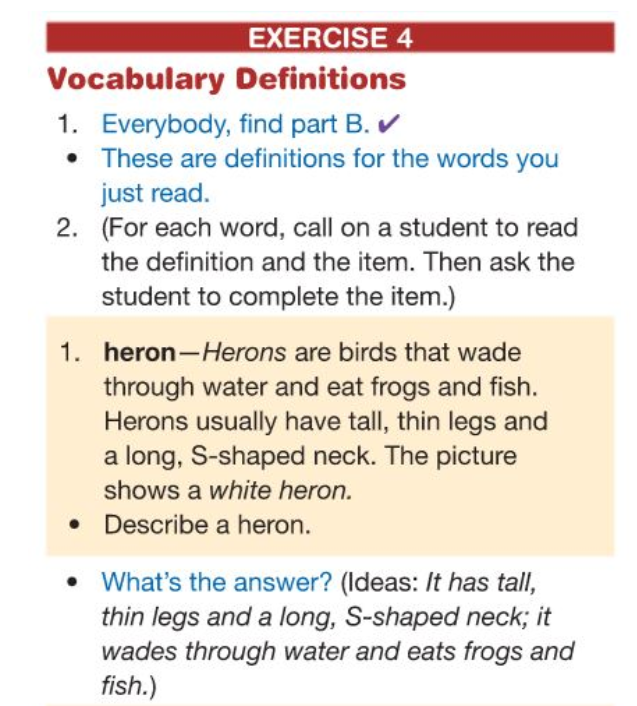Teach Reading Mastery Signature Edition: Year 4 and 5
-
Module Introduction5 Topics
-
Overview14 Topics|1 Test
-
Setting up for Success21 Topics|2 Tests
-
Cover
-
Lesson Objective
-
Opening the Lesson
-
Professional Learning Standards, Techniques, and Practices
-
Placement Tests Overview
-
Placement Test Guidelines
-
RMSE 4–5 Placement Test Specifics
-
RMSE 4 Placement Test
-
RMSE 5 Placement Test
-
Grouping and Seating
-
Pacing of Instruction
-
Expected Lesson Pacing
-
Check Your Understanding
-
Effective Transitions
-
Script Features
-
Auditory Signal
-
Scenario: Auditory Signal
-
Auditory Signal
-
Test Your Understanding
-
Review
-
Lesson Completed!
-
Cover
-
Word Practice and Vocabulary19 Topics|1 Test
-
Cover
-
Lesson objective
-
Opening the lesson
-
Parts of a RMSE 4 – 5 Lesson
-
Word Practice
-
Teaching Word Practice
-
Auditory Signal
-
Auditory Signal
-
Teacher’s Role in Motivation
-
Using affirmations in lessons
-
Correcting Word Practice Errors
-
Droning and Corrections
-
Vocabulary Exercises
-
Types of Vocabulary Exercises
-
Teaching Vocabulary Exercises
-
Vocabulary Exercises Corrections
-
Check your understanding
-
Review
-
Lesson completed!
-
Cover
-
Comprehension Concepts RMSE 416 Topics|1 Test
-
Comprehension Concepts RMSE 521 Topics|1 Test
-
Cover
-
Lesson objective
-
Opening the lesson
-
Comprehension Concepts
-
Outlining
-
Teaching Outlining
-
Relevant Information
-
Contradictions
-
Figurative Language
-
Inferences
-
Referents and Combined Sentences
-
Following Directions and Reference Books
-
Maps and Graphs
-
Irony and Logic
-
Individual Turns Procedures
-
Comprehension Concepts Teaching Techniques
-
Script Success
-
Lesson practice
-
Check your understanding
-
Review
-
Lesson completed!
-
Cover
-
Oral Reading and Silent Reading15 Topics|1 Test
-
Cover
-
Lesson objective
-
Opening the lesson
-
Oral Reading
-
Story Background Passages
-
Textbook Selections
-
Decoding error limits
-
Background Passage and Textbook Teaching Tips
-
Background Passage and Textbook Selection Corrections
-
Silent Reading
-
Comprehension Questions
-
Comprehension Questions Corrections
-
Check your understanding
-
Review
-
Lesson completed!
-
Cover
-
Independent Work and Work Checks15 Topics|1 Test
-
Cover
-
Lesson objective
-
Opening the lesson
-
Independent Work General Information
-
Conducting Independent Work
-
Active Monitoring Rationale
-
Active Monitoring Procedure
-
Active Monitoring Guidelines
-
Conducting Work-checks
-
Work Checks
-
Work-check Teaching Tips
-
Check your understanding
-
Active monitoring
-
Review
-
Lesson completed!
-
Cover
-
Writing Assignments, Decoding Support, Paired Practice, Fact Games, Activities across the Curriculum13 Topics|1 Test
-
Motivating Students15 Topics|1 Test
-
Mastery Tests and Fluency Checkouts18 Topics|1 Test
-
Cover
-
Lesson objective
-
Opening the lesson
-
Mastery Tests
-
Fluency Checkouts
-
Conducting Mastery Tests/ Checkouts
-
Using Mastery Tests and Fluency Checkouts
-
Mastery Tests Criterion
-
Mastery Test on SPT
-
Flight Path Concept
-
Inputting data on SPT
-
Expected Lesson Pacing
-
Lesson Progress on SPT
-
Pacing of Instruction
-
Effective Transitions
-
Check your understanding
-
Review
-
Lesson completed!
-
Cover
-
Bringing it all Together for RMSE 417 Topics|1 Test
-
Cover
-
Lesson objective
-
Opening the lesson
-
Auditory Signal
-
Lesson 21, exercise 1
-
Lesson 21, exercise 2
-
Lesson 21, exercise 3
-
Lesson 21, exercise 4
-
Lesson 21, exercise 5
-
Lesson 21, exercise 6
-
Lesson 21, exercise 7
-
Lesson 21, exercise 8
-
Lesson 21, exercise 9
-
Lesson 21, exercise 10
-
Check your understanding
-
Review
-
Lesson completed!
-
Cover
-
Bringing it all Together for RMSE 519 Topics|1 Test
-
Cover
-
Lesson objective
-
Opening the lesson
-
Auditory Signal
-
Lesson 37, exercise 1
-
Lesson 37, exercise 2
-
Lesson 37, exercise 3
-
Lesson 37, exercise 4
-
Lesson 37, exercise 5
-
Lesson 37, exercise 6
-
Lesson 37, exercise 7
-
Lesson 37, exercise 8
-
Paired Practice
-
Lesson 37, exercise 9
-
Lesson 37, exercise 10
-
Lesson 37, exercise 11
-
Check your understanding
-
Review
-
Lesson completed!
-
Cover
-
Module evaluation survey1 Topic

Types of Vocabulary Exercises
There are five different types of vocabulary exercises:
- Teacher Definition
Define a vocabulary word and show students how to use it in a sentence context.
- Written Definition
Individual students read vocabulary definitions and then answer questions about the words.

- Using context to predict meaning
The meanings of some vocabulary words can be predicted from sentence context. Students hear or read a sentence then predict the word’s meaning.
- Identifying the meanings of common words
Ask individual students to define words they may already know.
- Vocabulary Review
After vocabulary words are introduced, they are reviewed in different kinds of exercises. Some appear in the textbook. For these exercises, students identify the meaning of a word and then use it in context. Other vocabulary words are reviewed in workbook exercises. In workbook exercises. Students use a list of vocabulary words to complete sentences or crossword puzzles.
Turn to page 11 in ‘RMSE 5’ Teacher’s Guide. Look at how vocabulary definitions are taught in exercise 4.

